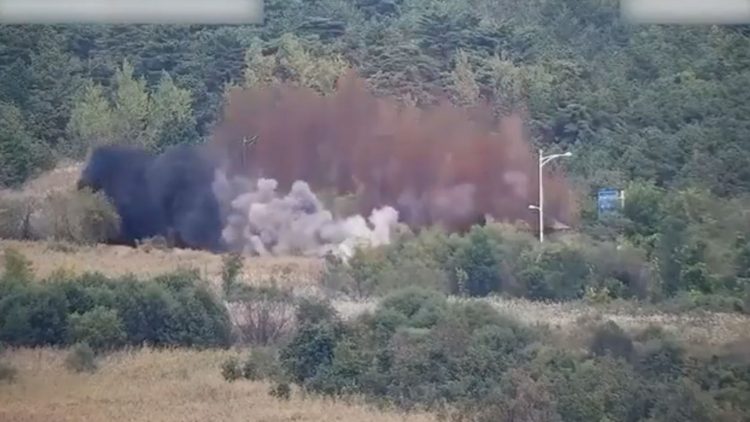Kim Jong Un’s regime seems to be sending a message: North Korea is done with diplomacy and cooperation and is instead focused on self-preservation and militarization.
But there’s more to the story. Just last week, North Korea accused South Korea of sending drones over Pyongyang, allegedly dropping anti-regime leaflets.
While South Korea initially denied the claims, the accusation sparked outrage in the North.
Kim’s sister, Kim Yo Jong, warned of a “horrible disaster” if more drones were detected.
These accusations, along with the road demolitions, show that North Korea is not just preparing for conflict—it’s actively escalating tensions.
In response, South Korea’s military fired warning shots. While no damage was reported on South Korea’s side of the border, the message was clear: the South is not backing down.
The South Korean military is also on high alert, ramping up surveillance and preparedness as the situation continues to deteriorate.
The Abandonment of Unification
For decades, the idea of unification has been a central part of Korean politics, even if it seemed far-fetched at times.
There was always a belief—however tenuous—that someday, the two Koreas might reunite.
However, Kim Jong Un’s recent actions make it clear that unification is no longer a goal for the North.
Instead, North Korea is moving toward a “two-state” system, permanently cutting itself off from its southern neighbor.
North Korea has blown up roads on its side of the border with South Korea
North Korea has blown up sections of roads and railroad lines on its side of the fortified border between the two countries, South Korea’s military said. In response, the South Korean military fired… pic.twitter.com/epXXdhUUlq
— NEXTA (@nexta_tv) October 15, 2024
This shift has huge implications, not only for the Korean Peninsula but for the wider geopolitical landscape.
By officially abandoning unification and fortifying its border, North Korea is drawing an even thicker line between itself and South Korea. And that line is militarized, heavily guarded, and growing stronger by the day.
What’s Next for the Korean Peninsula?
The recent explosions and border fortifications indicate that North Korea is preparing for the long haul.
With missiles, landmines, and anti-tank barriers in place, the regime is setting itself up for a defensive stance, suggesting that it expects increased tensions or even conflict in the future.
The road detonations might seem like an isolated act, but they’re part of a broader strategy of disengagement and military readiness.
For South Korea, these actions are a clear provocation.
While the South has responded with restraint—issuing warning shots rather than escalating further—the situation remains fragile.
Any additional provocations, such as further drone incidents or border skirmishes, could quickly escalate into a more serious conflict.
The International Impact
The fallout from these events isn’t limited to the Korean Peninsula.
North Korea’s actions will undoubtedly attract the attention of global powers like the United States and China, who have long been key players in the region’s stability.
For the US, which maintains a strong military presence in South Korea, this is a concerning development.
Washington has a vested interest in preventing conflict on the peninsula, and Pyongyang’s recent moves could force America to increase its involvement in the region.
Meanwhile, China, North Korea’s most significant ally, may be watching closely to see how this plays out. While China has supported North Korea in the past, an escalation in tensions could put Beijing in a difficult position, particularly if it leads to broader instability in the region.
Final Thoughts: A Step Backward
The demolition of symbolic roads and railways is more than just a physical act of destruction—it’s a deliberate severing of ties, a rejection of peace, and a sign that North Korea is digging in for a more hostile future. By fortifying its border and abandoning the goal of unification, North Korea is taking a step backward, toward isolation and militarization.
For now, both North and South Korea are locked in a tense standoff, with the possibility of further provocations on the horizon. As the world watches, one thing is clear: the Korean Peninsula remains one of the most volatile and unpredictable regions in global politics. Whether these actions lead to deeper conflict or a recalibration of diplomatic efforts, only time will tell.
—
Disclaimer: SOFREP utilizes AI for image generation and article research. Occasionally, it’s like handing a chimpanzee the keys to your liquor cabinet. It’s not always perfect and if a mistake is made, we own up to it full stop. In a world where information comes at us in tidal waves, it is an important tool that helps us sift through the brass for live rounds.










COMMENTS